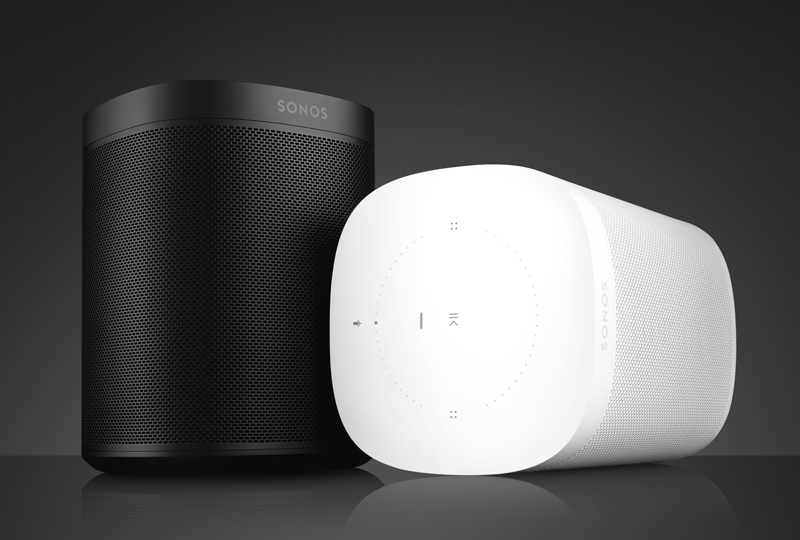What Sonos' IPO Means For Your Smart Home
Here's why one of the biggest smart-home players just went public.
The data is clear: The smart-speaker market is growing. It's growing so much, in fact, that one of its biggest players just went public.
"Sonos has been on the market for so long," explained Lidiane Jones, Sonos' VP of Software Product Management. "Given the team that we have and the brand that we've built, it's the perfect time for investors to embrace our product."

The company, manufacturer of such leading smart speakers as the Sonos One and Sonos Beam, opened its first day at $15 a share, heralded by a redesigned NASDAQ bell. Despite opening with a slightly lower valuation than the company hoped for, experts say this is a good sign for the market for smart speakers, and for smart-home devices in general.
"It's not a surprise that we're seeing another IPO for a company in the smart home space; the market opportunity for the connected home and IoT more broadly is enormous," said Mitchell Klein, executive director of the Z-Wave Alliance, a consortium of smart-home leaders that counts LG, Verizon, Samsung SmartThings, ADT, Schlage, Honeywell, Belkin, and August among its 700 members.
Klein sees the IPO as a sign that smart-home technology is "finally seeing real mainstream consumer interest and adoption."
While many consumer-tech companies have had rocky IPOs, the smart-home sphere has seen more success. Home-automation company Control4, which went public in 2013, reported 13 percent growth from the second quarter of 2017 earlier today. Alarm.com, which provides cloud-based remote monitoring and home-automation technology, reported revenue growth of 25 percent in the latest quarter.
"I think we'll see more companies like Sonos trying to emulate that," Klein said.
Get instant access to breaking news, the hottest reviews, great deals and helpful tips.
MORE: Best Smart Speakers
And according to Bart Mroz, CEO of digital-commerce consulting firm SUMO Heavy, the surge of investment could give Sonos the boost it needs to edge out big-time competitors Amazon and Google in the smart-speaker race.
"The two dominant smart speakers on the market, Amazon Echo and Google Home, are positioned as voice assistants first, smart speakers second," Mroz wrote in an email. "Sonos takes the opposite approach, which actually makes their devices seem more practical to the average consumer. Sonos now has an opportunity to leverage this difference in positioning to help boost consumer adoption of voice assistants."
"For Sonos, there's no better time than now for its IPO," he said.
What this means for you
A bigger foot in the smart-home door will give Sonos the opportunity to expand into new product categories, said Jones.
While the company is primarily an audio leader, that category has grown broader in the past few years. While Sonos' most recent release, the Sonos Beam, is a soundbar first, having Alexa built in lets you use the Beam to control your TV using just your voice. And with speakers and voice assistants built into everything from alarm clocks to security cameras now, it's likely we'll see a more diverse array of audio-enabled smart devices coming from companies like Sonos in the future.
Jones declined to comment on Sonos' speciifc new product ambitions, but noted that the company currently has 570 patents in progress. The IPO "gives us an ability for us to be more ambitious and bold about our plans," she said.
Rick Kowalski, senior manager of industry and business intelligence at the Consumer Technology Association, noted that we're likely to see more companies (including, potentially, Sonos) expand into more pragmatic and niche smart-home areas in the upcoming months.
"The key things we're seeing people picking up on are devices that help with home security," said Kowalski. "Wi-Fi cameras, smart doorbells, smart door locks." He also mentioned that smart lighting, smart window blinds, and energy consumption devices as areas where we're likely to see growth.
That said, when it comes to new smart-home owners, the smart speaker is often the entry point. And while the Echo and the Google Home deliver decent audio, they aren't the best-sounding or best-looking smart speakers. Their main appeal is the voice assistant within.
Third-party speakers like the Sonos One offer a glimpse of another way: A smart home device that's worth buying on its own merits, regardless of whether it has Alexa or Google Assistant.
Monica Chin is a writer at The Verge, covering computers. Previously, she was a staff writer for Tom's Guide, where she wrote about everything from artificial intelligence to social media and the internet of things to. She had a particular focus on smart home, reviewing multiple devices. In her downtime, you can usually find her at poetry slams, attempting to exercise, or yelling at people on Twitter.
